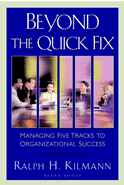






 |
     
|
|
||||||

|
Beyond the Quick Fix: Managing Five Tracks to Organizational
Success
By Ralph H. Kilmann 2004/01 - Beard Books 1587982188 - Paperback - Reprint - 320 pp. US$34.95 This book will awaken executives, managers, consultants, and scholars to a truly holistic approach to organizational change in today's interconnected world. Publisher Comments
Anyone who has worked for an organization has experienced the quick fix: a Band-aid applied directly to the symptom of a problem while ignoring the true complexities of organizational life. In today's complex world a non-quick fix is needed to create and maintain organizational success-a completely integrated program. The author points out that the core of such a program is a carefully orchestrated sequence of five tracks. The first three tracks address the people side of the organization, often called the informal side. The last two tracks address the formal side of the organization, providing guidance to employees as what they are supposed to do. Aligning all aspects of the organization into a unified effort is mandatory for long-term success. From Turnarounds and Workouts Every few years, a new approach is offered for unleashing the full potential of organized efforts. These are the quick fixes to which the title of this book refers. The jargon of the quick fix is familiar to any businessperson: decentralization, human resources, restructuring, mission statement, corporate strategy, corporate culture, and so on. These terms are all limited in scope or objective, and some are even irrelevant or misconceived with regard to the overall well-being and purpose of a corporation. With his extensive experience as a corporate consultant, author of numerous articles, and professor in business studies, Kilmann recognizes that each new idea for optimum performance and results is germane to some area of a corporation. However, he also recognizes that each new idea inevitably falls short in bringing positive change – that is, a change that is spread throughout the corporation and is lasting. At best, when a corporation relies on an alluring, and sometimes little more than fashionable, idea, it is a wasteful distraction. At worst, it can skew a corporate organization and its operations, thereby allowing the corporation’s true problems or weaknesses to grow until they become ruinous. As the author puts it, “Essentially, it is not the single approach of culture, strategy, or restructuring that is inherently ineffective. Rather, each is ineffective only if it is applied by itself – as a 'quick fix'.” Kilmann tells corporate leaders how to break the cycle of embracing a quick fix, discarding it after it proves ineffective, and then turning to a newer and ostensibly better quick fix that soon proves to be equally ineffective. For a corporation to break this self-defeating cycle, the author offers a five-track program. The five tracks, or elements, of this program are corporate culture, management skills, team-building, strategy-structure, and reward system. These elements are interrelated. The virtue of Kilmann’s multidimensional five-track program is that it addresses a corporation in its entirety, not simply parts of it. Kilmann’s five tracks offer structural and operational aspects of a corporation that executives and managers will find familiar in their day-to-day leadership and strategic thinking. Thus, the author does not introduce any unfamiliar or radical perspectives or ideas, but rather advises readers on how to get all parts of a corporation involved in productive change by integrating the five tracks into “a carefully designed sequence of action: one by one, each track sets the stage for the next track.” Kilmann does more, though, than bring all significant features of a modern corporation together in a five-track program and demonstrate the interrelation of its elements. His singularly pertinent and useful contribution is providing a sequence of steps to be implemented with respect to each track so that a corporation progresses toward its goals in an integrated way. Beyond the Quick Fix is a manual for implementing and evaluating the progress of a five-track program for corporate success. The book should be read by any corporate leader desiring to bring change to his or her organization. Ralph H. Kilmann has been connected with the University of Pittsburgh for 30 years. For a time, he was its George H. Love Professor of Organization and Management at its Katz Graduate School of Business. Additionally, he is president of a firm specializing in quantum transformations. In this reissue of the edition first published by Jossey-Bass, Kilmann, a consultant who formerly taught at the University of Pittsburgh, debunks the myth that simple solutions can solve complex organizational problems. He proposes the integration of five tracks in his barriers to success theory: culture, management skills, team-building, strategy-structure, and the reward system. Annotation ©2004 Book News, Inc., Portland, OR From John M. Sebeson This is a compelling and powerful model for implementing the changes required to create a culture of continuous improvement. If we wish to serve our customers with excellence now and in the future, we cannot afford to ignore these ideas and methods. From Wade Wnuk We now can enjoy a common language and a systematic framework to discuss what we are doing, why we want to do it, how some things can be achieved, and what the appropriate timing is. A solid overall conceptualized approach to re-energizing a company. From John H. Zimmerman Beyond the Quick Fix will certainly be an outstanding contribution to the business community. As we encounter new levels of complexity and breath in the factors that mandate change, it is important that we manage our response through a well-discipline process. This book provides this process. From Dr. Paul A. Banas Kilmann has produced a book that should be part of the reference library of anyone serious about organizational change. It is especially valuable to those who are looking for a model to guide them in their initial efforts, but also contains much for the experienced practitioner.
|
|
|
|
home
| about
us | contact
us | related
sites |